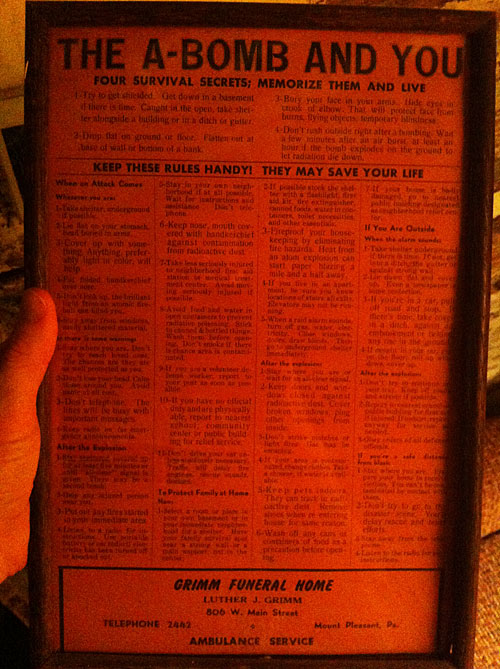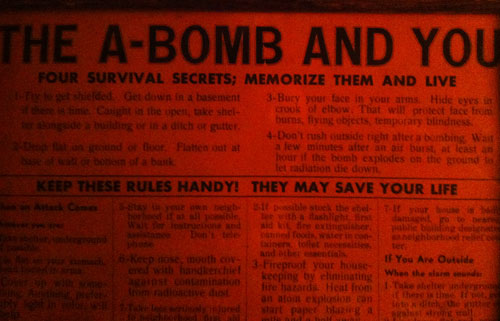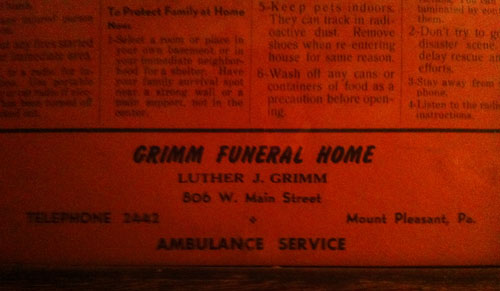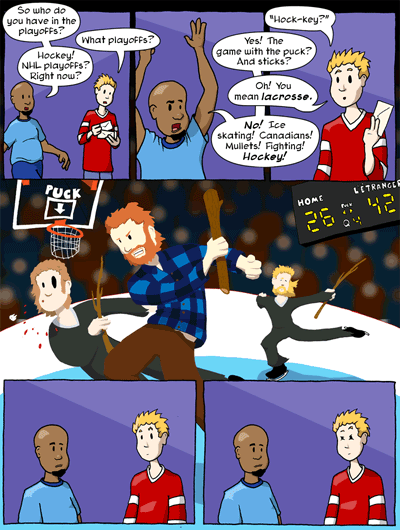
So, when I got the aforementioned iPad at a delicious Moroccan dinner with Kara’s family, I thought I had had a lovely thirtieth birthday and now all that nonsense was over with. She and I had planned to go get lunch and see Meek’s Cutoff with our friend Arlie yesterday, and I thought that would be a neat Saturday. When we parked near the theater downtown, though, she kept insisting we had to go meet Arlie at Pioneer Square a few blocks away. Okay, I thought, whatever.
Except when we got there, I saw someone else I recognized. Hey neat, I thought, Kellie’s here too! And so are a lot of our other friends! Wow, this is a weird coincidence. Why are they holding signs and shouting at me?
Kara had been planning a giant pervasive game involving everyone we know–even utilizing international design services–for a month behind my back. I was completely unaware of this until well after she started explaining the rules. It was basically a version of Journey to the End of the Night, except during the day, and also the only person being chased was me. I had to run around, getting the signatures of people stationed at five different checkpoints on the “happy” side of my birthday card. Each checkpoint had a small safe zone around it, but outside those, everyone else would be chasing me down; if they tagged me they got to sign the “unhappy” side of the card, and the person who did so most often got a prize. (Spoilers: no he didn’t.)
Herein follows the narrative of my desperate attempt to evade my relentless, sadistic friends. You can follow along on the big map I drew. It’s color-coded by time: my route to the first checkpoint is in blue, then red, then green, then orange.
We started in Pioneer Square, where I took off in an attempt to get a head start before I had completely finished reading the handout. THIS WOULD BE IMPORTANT LATER. I circled around down off the bottom border of the map and made my way up along Naito Parkway to the first checkpoint, the fountain at Saturday Market. I got into the safe zone just ahead of Kellie, in plenty of time to get my card signed by Tony and Mandy, then successfully lost any pursuers in the crowd.
Unfortunately, in doing so, I also dropped the card and couldn’t find it even after repeatedly retracing my steps. I ended up paying three bucks at the Market for a little card with an engraving of a cat holding a fish on it just so I could continue the game. I headed up to a good place to take the measure of the second checkpoint, the Chinese Gardens, and even from blocks away I could see a cluster of chasers just waiting for me.
“Aha!” I thought, as the stealthy Matthew Schuler walked right up and tagged me from behind. “I have clearly tricked these poor saps into thinking I will hit each checkpoint in order, which is not required by these rules that I have not read all the way through! I’ll just skip up to checkpoint 4 now and double back after they get bored and wander off. Good thing I have limitless endurance and it is not hailing!”
I was wrong about many of these things.
I actually used the hail as cover to get into the fourth checkpoint, the Blue Room at Powell’s Books, cleverly evading the nonexistent people I was convinced were waiting at THAT entrance. I then wandered around the Blue Room for ten minutes, wondering where the hell my signatory was, before Susan finally deigned to arrive and inform me that the window for her checkpoint had yet to open.
“Window?” I said.
“Did you read the rules?” she said.
I had already missed my chance to hit checkpoint 2, by dint of sheer idiocy, but I had maybe enough time to still make it to checkpoint 3 if I really hustled. This is why the red segment on the map is the longest one! I did hustle, and made it to the ticketing counter at Portland Union Station with a minute to spare, though my desperate, wheezing jog meant that I had no time for stealth and got ambushed by a whole group of fuckers in the driveway.
I threw off most of them by sneaking out a side entrance and hiding behind a bus, but just as I was thinking I’d sneak up the stairs to the Broadway Bridge and take that back down into the Pearl, I saw Matt Nolan tripping eagerly down them. I was still very annoyed at having my tag-count increased fivefold at the entrance, and I decided right there that Matt was NOT going to get me. No way! ALL I HAD TO DO WAS RUN INFINITELY FAR.
You will note that after the point labelled “MATT ATTACK” on the map, the green line travels around to the far side of the bridge entrance ramp, then up it, across traffic, to the top, back down, and into the Post Office. I only got that far because Matt was lugging a giant bag and a belly full of Indian food, and because I hid in the passport office with my gut sucked in and the lady at the postal counter heeded my desperate finger-to-lips silence gesture. I probably should have gotten arrested.
Anyway I left the post office, now running late for my RETURN VISIT to checkpoint 4, and immediately got tagged by Arlie, plus Matt finally caught up just outside the door to Powell’s. So much for all that. Despite my pulling moves which might humbly be described as “Bourneian” within the confines of Powell’s, I got tagged repeatedly in there too before I finally got Susan to sign my stupid card, and Grace (whom I hadn’t even met before!) pursued me doggedly through Whole Foods and in front of more speeding cars. It was only then that it occurred to me that Kara really should have gotten everyone to sign a waiver.
I limped up across the overpass, got ambushed, and lost the card AGAIN, though this time when I backtracked I actually did find it. That didn’t keep me from getting tagged like a brick wall on a street named after a civil rights activist, particularly by Jonathan (whom I’d faked out earlier) and Matt, who were out for blood. Not even sneaking through a parking garage under a building could throw them off. I finally staggered up to the fifth checkpoint outside the stadium with minutes to spare, and everybody got Oreo cupcakes and went back to a bar for beers and war stories.
I measured that route against the scale on Google Maps and, by that rough math, I ran about fifty-six thousand kilometers altogether. I was tired and the leg I pulled last week was throbbing. I had also lost the game by every measure possible. It was awesome! Thanks to Laura, Amy, Arlie, Jonathan, Matt, Matthew, Matthew, Harry, Harry, Grace, John, Casey, Kim, Greg, Susan, Marie, Mandy, Tony, Jeremy, Holly, Kevan, anybody else I forgot, and especially Kara for pulling off the most ridiculous tailored birthday stunt I can imagine.





